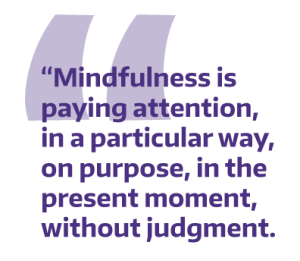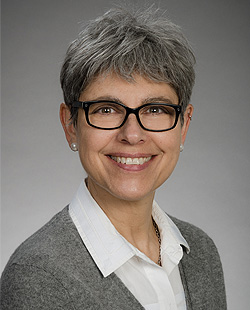
The Meaning of Mindfulness
As we kick off the new year, we invite you to make lasting, positive changes. Alongside your personal goals, we dare you to pause. Take time to reflect on what changes you will welcome in 2022 and consider bringing a practice of mindfulness into your daily life. If you have not already, click here to register for Dare to Do 2022 – A 22-Day Wellness Challenge!
These days, it seems as if we are surrounded by the concept of mindfulness. But is it just the latest trend, or is mindfulness really good for…everything? First, it’s important to understand what mindfulness is. Before embarking on any program with mindfulness in the title, it’s worth exploring the meaning of the term.
What is the definition of mindfulness?
Many existing definitions of mindfulness don’t feel entirely adequate. One of the more recognized definitions of mindfulness comes from Jon Kabat-Zinn, founding executive director of the Center for Mindfulness in Medicine, Health Care, and Society at the University of Massachusetts Medical School.
 He says, “mindfulness is paying attention, in a particular way, on purpose, in the present moment, without judgment.” This is a seemingly simple statement that actually contains some very profound basic principles of mindfulness.
He says, “mindfulness is paying attention, in a particular way, on purpose, in the present moment, without judgment.” This is a seemingly simple statement that actually contains some very profound basic principles of mindfulness.
Paying attention sounds superficially very easy, until we realize that we have arrived at work without having paid conscious attention to any moment of how we got there. Spending time in the present moment happens less often than you might realize.
Pause for a moment to think of how much time we spend mulling over the past or planning for the future and how little time we actually spend in the experience of being here, now.
The third element, non-judgment, can also be elusive. We love to sort things into good and bad, pleasant and unpleasant, for us or against us.
It is rare to merely meet an experience without judging it.
What does mindfulness look like? How can I learn to be mindful?
An easy way to look at mindfulness is as a means to train the mind. It is more of a process than an actual product. It can be thought of as the deliberate practice of cultivating presence and turning off autopilot. It is not about escaping reality, achieving bliss, or an altered state. It is about being fully present to reality.
The best way to learn mindfulness is to practice it. An excellent analogy is that everything that one can learn about the taste of a banana in a 20-week seminar is completely eclipsed by one bite. The one bite of mindfulness would equate to attending a daylong or weekend retreat, signing up for a five-week mindfulness training class, or an official eight-week, mindfulness-based stress-reduction class.
What in it for me? Why should I try it?
There is a mounting body of solid scientific evidence showing that mindfulness can enhance emotional self-regulation and positive emotional states. Mindfulness-based therapies have been useful in reducing relapses of patients with moderate depression, in reducing relapses of substance abuse, and even in diminishing self-harm and suicidal behavior in patients with borderline personalities.
Mindfulness presents an opportunity to be more fully present in one’s life. Cultivating the qualities of presence and non-judgment in the present moment can be revolutionary.
It’s hard to believe that anything is really good for everything. However, in our current state of highly fragmented attention, it is hard to think of any instance in which mindfulness would not support us. .
Looking for more? Practice mindfulness with these January events
1. Explore mindfulness further at a webinar with UW Recreation mindfulness manager Danny Arguetty on Monday, Jan 10. Start the New Year with added awareness and perspective as you explore and experience the power of mindfulness and better understand the science of behavioral change. Learn more and register here.
2. Join The Whole U each Monday at 10:00 a.m. for a guided meditation.
3. Sign-up for a mindfulness and stress free living course with UW Recreation. Over 4 weeks, participants will learn new meditation techniques, apply the teachings and garner tips and tools to implement a regular meditation practice. Increase mental clarity, improve academic performance, reduce stress, and improve your sleep.
4. Delve deeper into mindfulness practice with this Q&A with Dr. Richard Berger, professor emeritus for the School of Medicine, on how he developed his own mindfulness practice.
Thank you to AT&T, UW Medicine, and BECU for sponsoring Dare to Do 2022!
 Claudia Finkelstein, M.D.C.M., is a board certified physician with Long Term Care Services at UW Medicine and a UW associate professor of General Internal Medicine. She directs the UW School of Medicine Faculty Wellness Programs and has been endeavoring to be mindful for well over a decade.
Claudia Finkelstein, M.D.C.M., is a board certified physician with Long Term Care Services at UW Medicine and a UW associate professor of General Internal Medicine. She directs the UW School of Medicine Faculty Wellness Programs and has been endeavoring to be mindful for well over a decade.